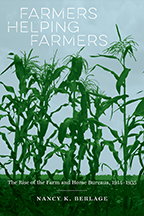Finalist for the 2017 Jon Gjerde Prize for the Best Book in Midwestern History
Finalist for the 2017 Benjamin F. Shambaugh Award
One of the largest volunteer movements in the twentieth century, local farm and home bureau organizations have been woefully underrepresented in socio-political studies of the American Farm Bureau Federation. Nancy K. Berlage addresses this omission with an insightful look at how bureau members put university science to work in agricultural and rural life at the local level, even while industrialization and urbanization profoundly shifted the landscape of labor in the United States.
In Farmers Helping Farmers, Berlage explores how bureaus served as the locus of science-based agriculture for rural communities. Drawing on community bonds and culturally powerful metaphors to overcome skepticism, bureaus played a critical role in circulating knowledge grounded in the new disciplines of agricultural economics, rural sociology, home economics, veterinary medicine, child science, and public health. Berlage also weaves a novel consideration of women’s roles into the story of farm and home bureaus, noting that these organizations provided the means by which supporters could grapple with issues beyond farming practices, such as child welfare, personal health, and gender ideals. They were also crucial in advancing the underlying mission of the American Farm Bureau Federation to strengthen community and family ties to the benefit of more efficient and productive farms.
In addition to bureau documents, Berlage draws from cartoons, films, photographs, and personal correspondence to add a human dimension to this organizational history. The resultant analysis offers a fresh look at the local bureaus’ social, economic, cultural, and political functions and highlights the organizations’ significant influence on American life in the early twentieth century.
1. Organizational Structure: The Rise of the Local Farm Bureau
2. Organizational Strategy: Economic, Political, and Social Functions
3. Science, Cultural Authority, and the Farm Bureau: Bovine Tuberculosis
4. Home Bureaus and the Sciences of Separate Spheres
5. Women and the Agricultural Occupation
6. Reproducing the Farm Family: Youth Clubs, Gender, and Science
Nancy K. Berlage is assistant professor in the Department of History and the Public History Program at Texas State University.
Praise for Farmers Helping Farmers
“This examination uses sources from local chapters to position the association as a vital social and cultural aspect of rural life. . . . Land grant universities and libraries with agricultural interests will want this book in their collections. Highly recommended.”—CHOICE
“Farmers Helping Farmers summarizes much that can be learned from Farm and Home Bureau publications and memoirs about the practical, social, and political activities and functions of this important movement. By treating the movement from the bottom up, it makes a distinctive contribution to our understanding of rural society and culture in relation to broader agricultural and environmental concerns. Instead of being vehicles for imposing business interests or unwelcome expertise on reluctant country folk, Berlage’s Farm and Home Bureaus harnessed and fostered the enthusiasm of farm families for reliable knowledge and its practical applications. Using extension agents as their allies, and choosing among opportunities for reform and improvement, many farmers made the bureau movement their means of embracing scientific change. Berlage’s insights may well have wider applications, and this valuable book will repay thoughtful study and reflection.”—Christopher Clark, H-Net Reviews
